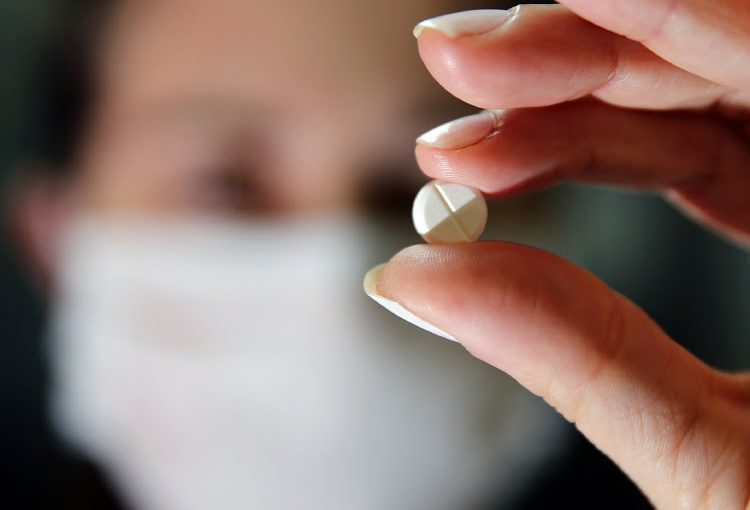South African rand muted before US inflation report, local data releases
SA tests chloroquine

FLE-A health worker holds a chloroquine pill distributed by the Ministry of Health at the pharmacy of the Nossa Senhora da Conceicao hospital, amid the Covid-19 outbreak in Porto Alegre, Brazil. [File photo: Reuters/: /Diego Vara]
- SA is taking part in a global trial to see if the anti-malarial drug chloroquine works to protect doctors and nurses at the frontline from contracting Covid-19 disease
US president Donald Trump has been pushing it as a remedy, with zero evidence. Now, SA is taking part in a global trial to see if the anti-malarial drug chloroquine works to protect doctors and nurses at the frontline from contracting Covid-19 disease.
The trial will test the drug, or a placebo, in 55,000 doctors and nurses in Ireland, SA, the UK, Zambia and the USA over five months. Where they do catch Covid-19, the study aims to assess whether they get a milder form of the virus.
This comes as evidence is emerging which says chloroquine might help stop the SARS-CoV-19 virus from entering certain cells in the lungs where it infects humans.
Tens of thousands, doctors and nurses worldwide have been infected with the virus, despite wearing protective gear. In Italy, more than 17,000 health workers fell ill — 10% of the country’s infections in mid-April.
SA hasn’t been spared this trend. In the Western Cape, as of last week, there were 1,010 cases of doctors, nurses and hospital staff testing positive for Covid-19, with six deaths and 462 known recoveries, according to the provincial health department.
Finding a way to help them would have a double benefit: if a health worker is infected, it means they have to quarantine, which means there are fewer staff to deal with real cases
Wits Intensivist professor Guy Richards said that as specialised doctors and ICU nurses got sick, it would strain the health system.
“SA is short of intensivists and ICU nurses, and as more of these staff become positive [for Covid-19] so the fall out rate for quarantine or illness compounds the problem.”
Professor Bruce Biccard, deputy head of the Department of Anaesthesia, who is involved in the trial, explained: “if we can prevent Covid-19 infection or decrease the severity of the infection in healthcare workers, it means we can ensure that our healthcare workforce can continue to provide care during this pandemic”.
And chloroquine is a cheap and widely available drug.
“This trial is important for many reasons. It repurposes a drug which has a long track record of safety in the management of malaria.”
One group of health workers will get a placebo and three groups will get different doses of chloroquine to see what is the lowest dose that may be effective. The lower the dose, the lower the chance of side effects.
The new trial comes as one part of the Solidarity trial to test chloroquine for treatment in very sick people with Covid-19 disease was “temporarily paused” by the World Health Organisation.
This happened after a report in the Lancet Journal showed that sick Covid-19 patients treated with the drug were more likely to die. WHO said the safety data on the chloroquine trial is being reviewed by the trials data safety monitoring board.
But this new global trial differs as it is using chloroquine for prevention and the dose is far lower and it is given to healthy people. Using low disease chloroquine is low risk.
Chloroquine was used as a malaria prevention pill for years and while mosquitoes are resistant to it now, it is used as a treatment by some patients with auto immune disorders including lupus and rheumatoid arthritis.
Biccard said the trial “has ethics approval in SA, USA, UK, Ireland and Zambia presently. It is ethical as there is no signal of harm in prophylaxis (prevention) trials and the dose is low.”
“The drug has very plausible mechanism to mitigate the effects of SARS-CoV-2; blocks some of the viral entry pathways into the cell, and concentrates in the lungs. ”
Professor Helen Rees, Executive Director of the Wits Reproductive Health and HIV Institute in Johannesburg said preventing illness in doctors and nurses could prevent a health system collapse.
“If an inexpensive drug such as chloroquine could help protect our health workers, it would provide important insurance for many countries whose healthcare systems could collapse if large numbers of healthcare workers were to become infected.”
The scientists want to see if chloroquine can decrease the severity of infection of how a doctor or nurse becomes infected.
Laurence Lovat, a professor of gastroenterology at University College London said, “with its anti-inflammatory properties, chloroquine might dampen the exaggerated and unregulated immune response in the host, which often is responsible for the unpredictable and severe complications of Covid-19.
By Katharine Child













Leave a Reply
Be the First to Comment!
You must be logged in to post a comment.
You must be logged in to post a comment.